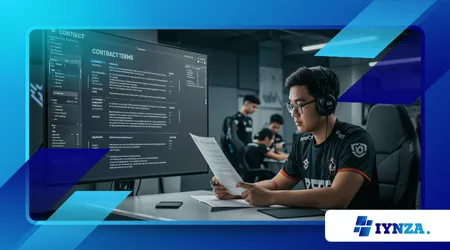Contratos de esports en 2025: Qué debes saber antes de firmar uno

Contratos de deportes electrónicos en 2025 Son más complejos que nunca y reflejan el crecimiento explosivo de los juegos competitivos.
Anuncios
Se proyecta que la audiencia mundial de deportes electrónicos superará los 640,8 millones en 2025, con marcas y equipos compitiendo por una porción de una industria de mil millones de dólares.
Independientemente de si eres un jugador en ascenso, un profesional experimentado o un entrenador, comprender los matices de estos acuerdos es fundamental.
Los contratos ya no se limitan a salarios: cubren repartos de patrocinio, obligaciones de streaming e incluso cláusulas de rendimiento impulsadas por IA.
Esta guía desglosa los aspectos esenciales y ofrece información práctica para desenvolverse en este panorama tan complejo. ¿Por qué firmar a ciegas cuando puede armarse de conocimiento?
El ecosistema de los esports prospera gracias al talento, pero los contratos son la base de la estabilidad profesional. Desde League of Legends hasta Valorant, los jugadores se enfrentan a retos únicos en 2025.
Los equipos exigen lealtad, los patrocinadores esperan visibilidad y los jugadores buscan condiciones justas. Los errores pueden obligarte a aceptar acuerdos restrictivos o perder ganancias.
Este artículo profundiza en Contratos de deportes electrónicos en 2025, combinando ejemplos del mundo real, tendencias actuales y consejos prácticos para garantizar que esté preparado antes de firmar.
La evolución de los contratos de deportes electrónicos
Los contratos de esports han madurado junto con la industria. En 2025, no serán simples acuerdos formales, sino documentos legales complejos. A diferencia de los deportes tradicionales, no existe un modelo universal.
Cada equipo crea acuerdos a medida, adaptados a su juego, región y objetivos. Por ejemplo, un profesional de Valorant podría enfrentarse a condiciones diferentes a las de un veterano de Counter-Strike. Esta diversidad exige un análisis riguroso.
Los contratos ahora abordan los matices de la era digital. Los equipos incluyen cláusulas para la interacción en redes sociales, lo que garantiza que los jugadores difundan información sobre patrocinadores en plataformas como TikTok.
Un estudio de Esports Charts de 2024 indicó que el 31% de los jóvenes de entre 18 y 29 años participa regularmente en esports, lo que hace que la visibilidad del jugador sea crucial. El incumplimiento de estas obligaciones puede reducir drásticamente las ganancias o generar sanciones.
++ Cómo crear un manual de estrategias para tu equipo competitivo (paso a paso)
Jugadores como "NexGen" (una estrella emergente ficticia de Overwatch) ilustran lo que está en juego. NexGen firmó un contrato sin revisar las cláusulas de streaming, perdiendo 20% de sus ingresos de Twitch a manos de su equipo. Estar al tanto de estos términos en constante evolución es innegociable en Contratos de deportes electrónicos en 2025.
La transición hacia contratos basados en datos es otra tendencia. Los equipos utilizan análisis de IA para monitorizar el rendimiento de los jugadores, vinculando las bonificaciones a métricas del juego, como el ratio de KDA.
Esto puede beneficiar a los jugadores, pero corre el riesgo de ser explotado si los términos son imprecisos. Siempre aclare cómo se utilizan los datos antes de firmar.

Cláusulas clave a tener en cuenta
Todo contrato es un campo minado de cláusulas. En Contratos de deportes electrónicos en 2025, ciertas disposiciones exigen una atención especial.
El alcance del trabajo define tu rol en torneos, retransmisiones o tareas promocionales. La ambigüedad en este aspecto puede sobrecargar a los jugadores con tareas inesperadas.
Las estructuras de compensación son fundamentales. Los salarios, la distribución de premios y la participación en los ingresos por streaming varían considerablemente. Algunos equipos reclaman hasta el 50% de las ganancias por patrocinio de un jugador.
Por ejemplo, un jugador de Dota 2 podría perder miles si la distribución de premios favorece a la organización. Negocie porcentajes claros de antemano.
Lea también: Por qué el meta no lo es todo: aprender a ganar con selecciones fuera del meta
Las cláusulas de rescisión pueden ser cruciales para una carrera. Sin condiciones claras, los equipos podrían liberar a jugadores sin previo aviso, como se vio en un caso de 2024 en el que un jugador francés de Valorant fue dado de baja a mitad de temporada. Asegúrese de que las condiciones de rescisión sean mutuas y justas. Contratos de deportes electrónicos en 2025.
Las cláusulas de no competencia son otra trampa. Algunas impiden que los jugadores se unan a equipos rivales durante años, lo que limita su movilidad. Siempre conviene establecer excepciones para patrocinios preexistentes para proteger los acuerdos de marca personal.
El papel de los patrocinios y la distribución de ingresos
Los patrocinios impulsan los esports, pero complican los contratos. En 2025, marcas como Coca-Cola y Mastercard invierten grandes cantidades, esperando que los jugadores muestren sus logotipos.
Contratos de deportes electrónicos en 2025 A menudo exigen publicaciones específicas en redes sociales o apariciones en transmisiones, vinculando su marca personal con los patrocinadores del equipo.
El reparto de ingresos es un tema polémico. Los equipos pueden reclamar una parte de los ingresos por publicidad en YouTube o las ganancias de los torneos.
Por ejemplo, "Viper" (una jugadora profesional ficticia de League of Legends) perdió 30% de su premio del Mundial debido a una cláusula contractual imprecisa. Exijan siempre transparencia en los repartos.
Leer más: El juego mental: cómo los mejores jugadores manejan la presión en las finales
Las obligaciones de patrocinio pueden entrar en conflicto con los acuerdos personales. Si te asocias con una bebida energética local, pero tu equipo firma con Monster Energy, surgen conflictos. Los contratos deben contemplar explícitamente las colaboraciones preexistentes para evitar disputas.
El seguimiento de patrocinios basado en IA es ahora común. Plataformas como Shikenso utilizan visión artificial para monitorear la exposición del logotipo, lo que influye en tus obligaciones. Comprende estas métricas para cumplir con las expectativas de los patrocinadores sin excederte.
Protecciones legales y derechos de los jugadores
Los jugadores son vulnerables sin garantías legales. Contratos de deportes electrónicos en 2025 Deben definirse derechos claros, especialmente en regiones como la UE, donde las leyes laborales son estrictas.
Las plantillas de contratos de deportes electrónicos de la UE, como las de Contractbook, enfatizan la protección de datos y la rescisión justa.
Las disputas por incumplimiento de contrato son comunes. Un caso de 2024 en Argentina reveló que algunos jugadores fueron clasificados erróneamente como contratistas y perdieron sus beneficios. Asegúrese de que su contrato especifique la situación laboral para obtener protecciones como el seguro médico.
Las cláusulas de traspaso pueden desarraigar a los jugadores. Algunos contratos permiten a los equipos traspasarlos internacionalmente sin consentimiento, como señaló The Washington Post. Exige poder de veto sobre los traspasos para mantener el control de tu carrera.
La asesoría legal es esencial. Contratar a un abogado con experiencia en esports, como el Sr. Justin M. Jacobson, puede evitar condiciones abusivas. No permita que la inexperiencia le atrape en un mal acuerdo.
El impacto de los deportes electrónicos móviles y la expansión global
Los deportes electrónicos móviles, como PUBG Mobile, dominarán en 2025, especialmente en el sur de Asia y MENA.
Contratos de deportes electrónicos en 2025 Reflejan este cambio con cláusulas adaptadas a los mercados que priorizan la movilidad. Los equipos esperan que los jugadores interactúen con los aficionados en plataformas como Instagram Reels.
La expansión global añade complejidad. Los contratos pueden incluir obligaciones de viaje para eventos como la Copa Mundial de Esports.
Las barreras lingüísticas y los problemas de visado, como se vio en el caso de Moist Esports en 2024, pueden complicar los acuerdos internacionales. Aclare el apoyo para viajes en los contratos.
Los contratos de esports móviles suelen priorizar la transmisión. Los jugadores deben transmitir en plataformas específicas, como YouTube, para maximizar su alcance. Asegúrate de que estas obligaciones se ajusten a tu horario para evitar el agotamiento.
Las diferencias culturales también importan. En Asia, los contratos pueden priorizar la lealtad del equipo sobre la imagen de marca individual, a diferencia de los acuerdos occidentales. Comprenda las normas regionales para negociar eficazmente.
Negociando su contrato como un profesional

La negociación es tu arma más poderosa. Contratos de deportes electrónicos en 2025 Recompensar a los jugadores que abogan por sí mismos.
Empieza por investigar los estándares del mercado: los mejores jugadores de Valorant pueden ganar entre 1TP y 20 000 T al mes, según Esports Insider. Conoce tu valor.
No aceptes la primera oferta. Los equipos suelen ofrecer precios bajos, esperando una respuesta negativa. Contrarresta con datos, como tu número de seguidores o las estadísticas del torneo, para justificar un salario más alto.
Contrate a un abogado con anticipación. Este puede detectar cláusulas ocultas, como cláusulas de no competencia excesivas, que limitan las oportunidades futuras. Un pequeño gasto inicial puede ahorrarle miles de dólares más adelante.
Considera objetivos a largo plazo. Si buscas construir una marca personal, prioriza las cláusulas que protejan los ingresos por streaming. Las ganancias a corto plazo no deberían sacrificar la libertad futura.
El futuro de los contratos de deportes electrónicos
El futuro de Contratos de deportes electrónicos en 2025 La clave reside en la adaptabilidad. Las cláusulas de rendimiento basadas en IA se incrementarán, vinculando el salario a métricas como la interacción con los aficionados. Esto podría empoderar a los jugadores, pero conlleva el riesgo de microgestión si las condiciones no son claras.
Están surgiendo contratos basados en blockchain. Estos garantizan la transparencia en la distribución de los pagos, especialmente en premios monetarios. Equipos como G2 Esports están experimentando con esta tecnología, lo que indica un cambio hacia la equidad.
Los sindicatos de jugadores están cobrando fuerza. En 2025, los clubes franceses de esports formaron una asociación profesional para abogar por mejores contratos. Unirse a estos grupos puede amplificar tu voz.
La sostenibilidad es clave. Los contratos pueden incluir cláusulas de salud mental, como descansos obligatorios, a medida que aumenta el agotamiento. Prioriza las condiciones que protejan tu bienestar.
| Cláusula | Descripción | Consideración clave |
|---|---|---|
| Alcance del trabajo | Define las funciones de los jugadores (torneos, streaming, promociones) | Asegúrese de que las tareas sean específicas para evitar el exceso de trabajo. |
| Compensación | Describe el salario, la distribución de premios y la participación en los ingresos por streaming. | Negociar porcentajes claros para todos los tipos de ingresos |
| Terminación | Especifica las condiciones para la finalización del contrato | Exigir condiciones mutuas para evitar liberaciones repentinas |
| No competencia | Restringe la incorporación a equipos rivales después del contrato | Limitar la duración y el alcance para proteger la movilidad |
| Obligaciones de patrocinio | Exige promoción de marca en redes sociales o transmisiones | Aclarar conflictos con patrocinios personales |
Conclusión: Firme con inteligencia y prospere en 2025
Contratos de deportes electrónicos en 2025 Son tu puerta de entrada a una carrera próspera o una trampa para los incautos. No son solo papeleo; son las reglas de tu juego profesional.
Como una jugada decisiva en una gran final, firmar con inteligencia requiere estrategia y precisión. Revise cada cláusula, negocie con firmeza y busque asesoramiento legal.
La industria de los esports es un coliseo digital, no entres a la arena sin estar preparado. ¿Estás listo para forjar tu futuro o dejarás que un mal contrato te deje en la banca?
Con el enfoque adecuado, puedes convertir tus contratos en oportunidades. Protege tus ingresos, asegura tus derechos y construye una carrera profesional sostenible. En 2025, el poder reside en quienes leen la letra pequeña.
Preguntas frecuentes
¿Qué debo priorizar en un contrato de esports?
Céntrese en una distribución clara de la compensación, cláusulas de rescisión justas y obligaciones de patrocinio. Asegúrese de que las cláusulas de no competencia no limiten excesivamente las oportunidades futuras.
¿Cómo puedo evitar malas condiciones contractuales?
Contrata a un abogado especializado en esports e investiga los estándares del mercado. Negocia según tu valor, utilizando estadísticas como el rendimiento en torneos o el alcance en redes sociales.
¿Son diferentes los contratos de deportes electrónicos móviles?
Sí, enfatizan el streaming y la interacción regional, especialmente en mercados como el sur de Asia. Aclarar las obligaciones específicas de cada plataforma para evitar conflictos.
¿Por qué son importantes los sindicatos de jugadores en 2025?
Los sindicatos abogan por contratos justos y protecciones, como las que se ven en la asociación de deportes electrónicos de Francia 2024, que otorga a los jugadores poder de negociación colectiva.
